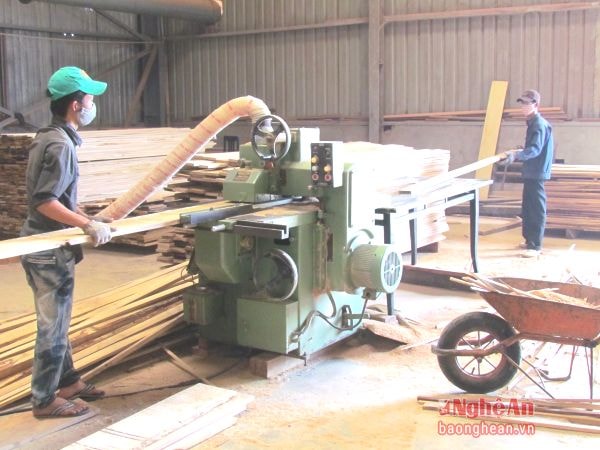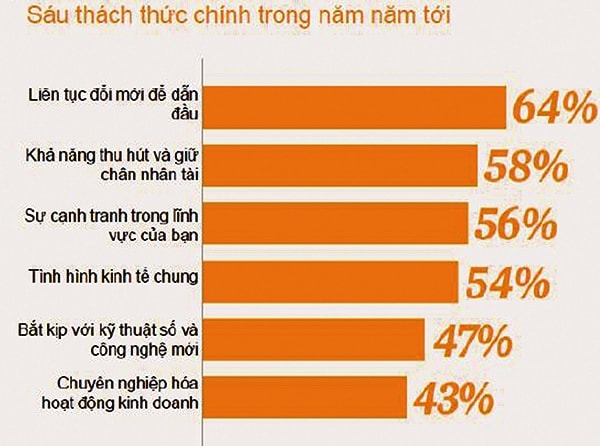100 large family businesses contribute about 1/4 of the country's GDP
The 100 largest family businesses in Vietnam contribute about a quarter of the country’s GDP. Family businesses have played a pioneering role in promoting economic recovery after the crisis, promoting the spirit of entrepreneurship.
The above information was given at the workshop "Professionalizing family businesses" organized by the Business Forum newspaper on the afternoon of June 24.
At the workshop, Mr. Vu Tien Loc, Chairman of the Vietnam Chamber of Commerce and Industry (VCCI) said: In every economy, family businesses (FBOs) play an important role as the core of the economy.
Especially in Vietnam, the most successful businesses in recent years are private enterprises, family enterprises, not state-owned enterprises.
Mr. Vu Tien Loc, Chairman of Vietnam Chamber of Commerce and Industry, spoke. |
According to Mr. Loc, the Vietnam Business & Family Council celebrates its 3rd anniversary in a special context. The Party and the State have had many more important guidelines and decisions on private enterprise development. The Resolution of the 12th Party Congress has many contents related to enterprise development, of which the 3 most important points are the 3 orientation axes for enterprise development in the coming time.
Firstly, the Party Congress affirmed that in 2020 we will basically complete the socialist-oriented market economic institution. This is the first time the Party has affirmed that the construction of a socialist-oriented market economic institution is consistent with the practices and standards of modern and integrated market economies in the world. This is extremely important, showing that we are looking at the world market economy and reaching for that standard. This contributes to the formation of a modern and integrated team of enterprises and entrepreneurs.
Second, for the first time, the Party Congress Resolution said that the private economy is an important driving force of the economy.
Third, the Resolution for the first time raised the requirement for start-ups and the requirement to improve the capacity of the private economic sector.
According to Mr. Vu Tien Loc: "The advantage of Vietnamese family businesses is the emotional bond of trust, but it also poses a challenge in balancing this relationship with the principles of professional corporate governance. Therefore, how to handle family and kinship relationships with the principles of transparent corporate governance is a big challenge for family businesses."
"The generation of children born into family businesses has many advantages. Each child has been doing business since they were in their mother's womb and has begun to be inspired by business during their adulthood. The young generations in business families have many advantages in accessing modern business management processes and have many advantages to succeed. That is the reason why many family business brands have been resoundingly successful in the world," Mr. Loc acknowledged.
 |
| Many family businesses are effective. Illustrative photo |
Consulting expert Hoang Duc Hung, Deputy General Director of PwC Vietnam, said that succession, maintenance and development of the enterprise through many generations is the desire of family-owned enterprises. Mr. Hung said that in a survey in the Asia-Pacific region alone, out of 5 family-owned enterprises, at least 1 enterprise has the ambition to compete in the international market.
Citing global survey data on the importance of the next generation in family businesses, Mr. Hung informed about some particularly noteworthy numbers: 16,000 billion USD will be transferred within the next 30 years, 40% of family businesses will be transferred to the next generation within the next 5 years. However, only 12% of family businesses can transfer to the third generation, often due to internal problems. This is a number that, according to Mr. Hung, is lower than expected.
The survey results also show that the majority of businesses want to improve their businesses but also understand that they have the responsibility to transfer a solid business to the next generation. Mr. Hung said that the next generation often has the mindset of improving the business after inheriting it, of which 69% of respondents said they would recruit professional staff from outside to bring modernity and professionalism to the business. In addition, 60% choose to expand the market in new geographical areas and only 47% agree to implement risky business projects in parallel with the main activities of the business.
"How can the next generation continue to succeed?", Mr. Hung asked and from there gave 10 golden rules for the ambitious next generation including: Accumulate outside experience first; Try before you buy; Only take on roles that are suitable for you; Be aware of your behavior; Do not put pressure on yourself; Ask for reasonable evaluation; Manage change carefully; Communicate, communicate, and communicate; Ensure that succession is a process; Enjoy this process.
Mr. Pham Dinh Doan, Chairman of the Vietnam Business and Family Council. |
Also concerned about succession in family businesses, Mr. Pham Dinh Doan, Chairman of the Vietnam Business and Family Council, said: The most obvious risk that can lead to the failure of a family business is the succession process. The transfer from one generation to the next is the weak point in the family business model.
Mr. Doan said that family-owned enterprises play a very important role in the Vietnamese economy. Family-owned enterprises tend to outperform other types of enterprises in terms of sales, profits and other growth indicators. In recent times, the strong development of Vietnamese family-owned enterprises has also helped form leading private economic groups in many fields and has made important contributions to the GDP of the entire economy.
However, every family business must always find a way to balance the interests of the family and the interests of the company. The process of transition between generations can cause conflicts between these two aspects, affecting both family relationships and business operations. On the contrary, an effective succession process will create good development momentum for the business, help the business to renew itself in the face of changing business conditions and find new energy for growth, diversification and professionalization.
It is common for family businesses to not have a formal succession plan. This is a big risk if there are family members who only own the business but do not work or manage it. Sometimes issues such as ownership or other rights of all members are not thoroughly discussed and agreed upon before the transition between generations, leading to each person having their own vision of how the business will operate in the future. This can cause conflicts when the next generation takes over the business.
Challenges that may come to family businesses in the next 5 years. |
Another common challenge is that the previous generation does not want to give up control completely even though they have transferred power to the next generation. "I share and appreciate the results of PwC's 2016 Next Generation Survey conducted with nearly 270 successor leaders at family businesses globally. Up to 61% believe that the previous generation will find it difficult to give up control completely when they take over the business. They often feel frustrated when trying to convince the current generation to accept their new ideas. This reality is also true for family businesses in Vietnam today," said Mr. Doan.
According to Mr. Doan, in order to successfully transfer, develop family businesses and contribute more to the economy, family businesses need to have a succession plan that is as clear and detailed as possible regarding the functions and tasks of each party involved, as well as the implementation time. This plan needs to be implemented as soon as possible before officially transferring power so that the successor can accumulate all the necessary skills and experience to take on executive positions in the business.
For example, the current generation can create conditions for their children to try out different positions inside or outside the company, or allow them to attend board meetings or seminars and events that the company participates in. From there, the next generation can better understand the problems of the company as well as expand their network of relationships.
At the workshop, experts and businesses discussed solutions to professionalize Vietnamese family businesses. Also at this event, the Vietnam Business & Family Council celebrated its 3rd anniversary, emphasizing the role of connecting typical and prestigious business families in the Vietnamese business community to help family businesses successfully achieve their development goals.
Hoang Duong/baotintuc
| RELATED NEWS |
|---|




